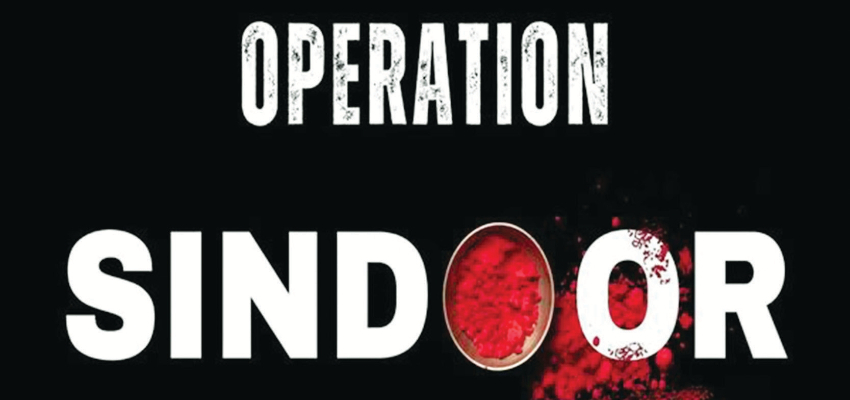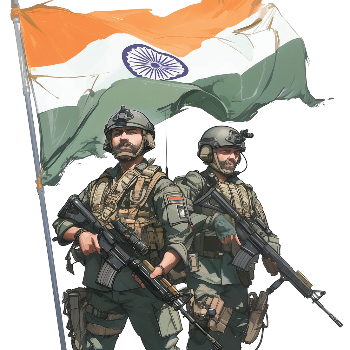Our statement against terrorism

While Operation Sindoor was conceived as a befitting answer to the terror unleashed at Pahalgam, killing 26 innocent tourists and traumatising their families, the response from India has been precise, calibrated and purposeful—not more, not less. Initially aimed at dismantling its terror hubs, India was forced to respond further, to the detriment of Pakistan, disabling much of its air and strike power. But, the aim has been clear—it’s a continuing war against terror and its perpetrators
By this time, all are aware of Operation Sindoor. Sindoor is the sacred sign indicating the marital status of Hindu women, the sacred vermilion powder they wear in the parting of their hair, after marriage. On the 22nd April in Pahalgam, 26 innocent male tourists were killed by Pakistan sponsored terrorists, in the presence of their wives and children, after confirming their religion. The killings were from a short range, targeted at the head of the victims. A young navy officer became one of the victims of this barbaric killing, only four days after marriage. The couple had gone to Pahalgam for their honeymoon. His wife begged the terrorists that she be killed too, but the request was turned down and she was told that she was being spared to tell the story to Prime Minister Narendra Modi.
Punitive reply

Our Prime Minister, who was in Saudi Arabia, cut short his official visit to take action. Operation Sindoor was conceived as a punitive action against the crimes of terrorists and their allies. The operation was executed from 7th May, when nine terrorist camps in PoK and also further in Pakistan, were razed—where roughly more than hundred terrorists were killed. Pakistan did not appreciate the killing of terrorists and the hubs, and in retaliation started killing our civilians and attacking our defence and civilian establishments. There was a non-escalatory and calibrated response from our side when 11 air bases of Pakistan were destroyed on the 10th morning (between 9th night and 10th morning). Our attack was with full precision so as to avoid civilian killings, while our defence was strong enough to neutralise their attacks. The Pakistan military requested our military to stop the operation, and the same was paused at 5 p.m, on the 10th. The operation is not over. Nor is there a ceasefire, but Pakistan’s behaviour will be on watch during the pause.
Purpose of Operation Sindoor:
- Conceived to punish the perpetrators and planners of terror.
- Aimed to destroy terror infrastructure across the border.
Intelligence and target selection:
- Carried out a microscopic scan of the terror landscape.
- Identified numerous terror camps and training sites.
Operation ethics and restraint:
- Operations under self-imposed restraint to avoid collateral damage.
- Only terrorist targets were to be neutralised, avoiding civilian harm (except for retaliation if damage done to us).
Associated non-kinetic response:
- Suspension of the Indus Waters Treaty, 1960.
- No trade till Pakistan stops cross-border terrorism.
- Deportation of unauthorised Pakistanis staying in India.
- Stopping the Wagah border ceremonial events.
New doctrine:
- Terrorism anytime will be considered an act of war and our forces will be free to retaliate, in the manner and time they choose. No nuclear black mail.
- Promoting media literacy campaigns, to educate citizens on how to identify fake news.
- Banning fake news origins.
Features of Operation Sindoor:
1. In an age of multi-domain warfare, where threats evolve faster than border shifts, India’s national security architecture has demonstrated the strength of joint operations and strategic foresight.
2. A calibrated, tri-services response that embodied precision, professionalism and purpose.
3. In just 22 minutes the punitive campaign was successful in dismantling nine terror camps, some located deep inside Pakistan, and killing more than 100 terrorists, including 10 family members of Masood Azhar.
4. The world saw the strength of comprehensive and multi-layered air defence architecture, which facilitated real-time threat identification, assessment, and interception across multiple domains. Hundreds of attacks of Pakistan could not penetrate our security.
5. The indigenously developed ‘Akash’ surface -to-air missile-system proved its mettle against the onslaught by Chinese and Turkish drones and other equipment. Our indigenous apparatus served as a big bonus along with S-400 purchased from Russia.
6. Together with our defence-system, our strike-system also surprised the world. In a matter of a few hours, we could dismantle 11 air bases, which included important ones, housing hangars of their F-16 planes and new generation Chinese planes as well. The devastation was inflicted in the vicinity of their nuclear storage premises, but our precision attacks skirted nuclear facilities. In our attacks, ‘BrahMos Missiles’ showed their brilliance.
7. India’s ‘Akashteer’ system shone in Operation Sindoor. DRDO expressed satisfaction and the world was surprised to see our outstanding battle equipment. This has led to many purchase requests for our weapons and defence equipment from many countries.
Outcome of Operation Sindoor:
1. It has been proved that India is militarily a powerful country
2. India can reach any part of Pakistan in a short time and adversely affect it.
3. Our indigenous weapons are very powerful, and the whole world has become aware of it.
4. We do not want to kill innocent lives even in war, but restrict ourselves to precision attacks to minimise collateral damage.
5. We can go to war with our principled objective and do not believe in prolonging war if our objective is met; we curb our emotional urge even if we are winning, as India believes more in peace than in war.
6. The sudden pause at the winning moment shows that India is more focused on becoming a developed country than wasting resources in war boosting emotions.
7. Scope for sudden rise of private sector in the defence equipment domain.
8. Superiority of Indian weapons proven over Chinese weapons that are with Pakistan.
Operation Sindoor has been nicely executed and now it is on pause. It may get activated again, depending upon the conduct of Pakistan and this time it may be more grave. Meanwhile, India has dispatched all party delegations to more than 30 countries to make them aware that our operation was limited to our fight against terrorism. Our operation had some escalation and that too when Pakistan reacted to our fight against terrorism. We stopped the operation the moment Pakistan agreed to stop. The U.S. President, Donald Trump, created some misunderstanding by his many comments so as to get some credit, which was not factually correct. There was some mistaken belief that the pause to the operation was achieved due to U.S. mediation, when it is our declared policy that we do not permit any mediation in our dealings with Pakistan. Our military and even our foreign minister has clarified it.
Other paths to pursue
Today, we have become the fourth largest economy in the world. Our trajectory of growth is on the climb, and we have a resolve to make India a developed nation by 2047. We did not deviate from this resolve during Operation Sindoor and paused it at the earliest opportunity. Further, we do not want to be hyphenated with a rogue country like Pakistan. We have high aspirations and we do not want to derail ourselves by staying engrossed in a war, after our limited objective is served. War is such a process that while it can be started by choice for any political or military reason, we can never know when it will end. We have an example of this from the Russia-Ukraine war, which is continuing for over three years, or from the continuing conflict between Israel and Hamas.
"Operation Sindoor is our statement against terrorism for the whole world to see. India has shown that a country has the sovereign right to protect its citizens, and for that even initiating a war is a sovereign duty"
Evil design
The very existence of Pakistan is coupled with an evil design on India, as it is, its stated resolve to hurt India by a thousand cuts. Terrorism is a part of its evil design, which it exports to India. The carriers of terrorism to India are sometimes its own sepoys in different garbs, like what we saw in the Kargil War or sometimes its trained proxies. Expansionist China, which has been our long-time enemy, has become an associate of Pakistan. Pakistan knows that it can never win against India in a battlefield and hence terrorism is being used as its weapon against India.
War on terrorism
“Terrorism is not something that is being conducted in the dark corners of Pakistan. It is done in broad daylight,” stated S. Jaishankar, Minister of External Affairs. It is really sad that till today the United Nations has failed to give a definition of ‘terrorism’, and that is one of the reasons terrorism is growing the world over, instead of being nipped in the bud. Operation Sindoor is our statement against terrorism for the whole world to see. India has shown that a country has the sovereign right to protect its citizens and for that even initiating a war is a sovereign duty.
Our Prime Minister has said that the only talks, which India will have with Pakistan are on Pakistan-occupied Kashmir and terrorism. We have proved that we are the only nuclear country, daring to fight against another nuclear country. We will keep giving lessons to Pakistan till it changes itself.